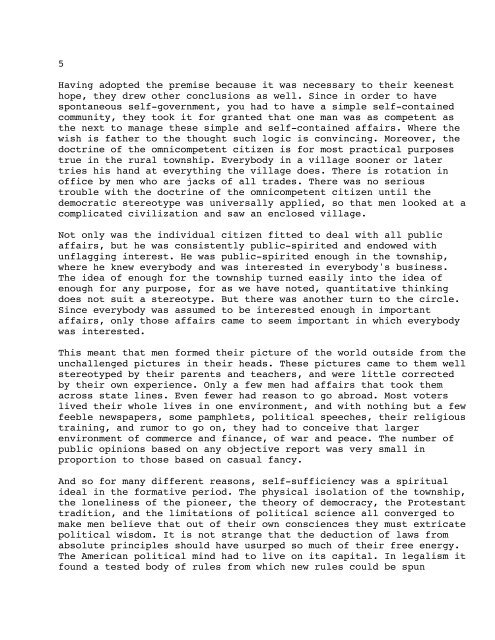PUBLIC OPINION by WALTER LIPPMANN TO FAYE LIPPMANN ...
PUBLIC OPINION by WALTER LIPPMANN TO FAYE LIPPMANN ...
PUBLIC OPINION by WALTER LIPPMANN TO FAYE LIPPMANN ...
Create successful ePaper yourself
Turn your PDF publications into a flip-book with our unique Google optimized e-Paper software.
5<br />
Having adopted the premise because it was necessary to their keenest<br />
hope, they drew other conclusions as well. Since in order to have<br />
spontaneous self-government, you had to have a simple self-contained<br />
community, they took it for granted that one man was as competent as<br />
the next to manage these simple and self-contained affairs. Where the<br />
wish is father to the thought such logic is convincing. Moreover, the<br />
doctrine of the omnicompetent citizen is for most practical purposes<br />
true in the rural township. Everybody in a village sooner or later<br />
tries his hand at everything the village does. There is rotation in<br />
office <strong>by</strong> men who are jacks of all trades. There was no serious<br />
trouble with the doctrine of the omnicompetent citizen until the<br />
democratic stereotype was universally applied, so that men looked at a<br />
complicated civilization and saw an enclosed village.<br />
Not only was the individual citizen fitted to deal with all public<br />
affairs, but he was consistently public-spirited and endowed with<br />
unflagging interest. He was public-spirited enough in the township,<br />
where he knew everybody and was interested in everybody's business.<br />
The idea of enough for the township turned easily into the idea of<br />
enough for any purpose, for as we have noted, quantitative thinking<br />
does not suit a stereotype. But there was another turn to the circle.<br />
Since everybody was assumed to be interested enough in important<br />
affairs, only those affairs came to seem important in which everybody<br />
was interested.<br />
This meant that men formed their picture of the world outside from the<br />
unchallenged pictures in their heads. These pictures came to them well<br />
stereotyped <strong>by</strong> their parents and teachers, and were little corrected<br />
<strong>by</strong> their own experience. Only a few men had affairs that took them<br />
across state lines. Even fewer had reason to go abroad. Most voters<br />
lived their whole lives in one environment, and with nothing but a few<br />
feeble newspapers, some pamphlets, political speeches, their religious<br />
training, and rumor to go on, they had to conceive that larger<br />
environment of commerce and finance, of war and peace. The number of<br />
public opinions based on any objective report was very small in<br />
proportion to those based on casual fancy.<br />
And so for many different reasons, self-sufficiency was a spiritual<br />
ideal in the formative period. The physical isolation of the township,<br />
the loneliness of the pioneer, the theory of democracy, the Protestant<br />
tradition, and the limitations of political science all converged to<br />
make men believe that out of their own consciences they must extricate<br />
political wisdom. It is not strange that the deduction of laws from<br />
absolute principles should have usurped so much of their free energy.<br />
The American political mind had to live on its capital. In legalism it<br />
found a tested body of rules from which new rules could be spun





